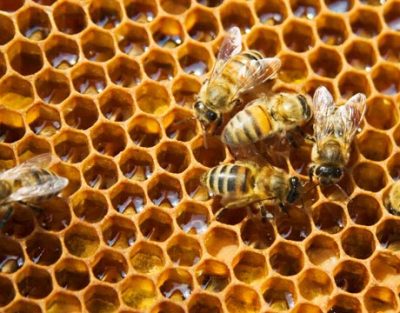By
Gloria Nakiyimba
Bee Keepers in Uganda are asking the Government to give them an area in the national forests where they can carry out large scale bee keeping.
Adolph Bagonza, the Executive Director for Kabarole Bee Keepers Association, wants the government to allow them to set up a number of bee hives in the forests where they can work without disturbance and inconveniencing the public.
“We want the government to give us an area where we can set up hives; very many of them” he said.
The Kabarole Bee keepers Association wants the government to allow them to operate in Matiri forest in the Kyegegwa district, where they can work without disturbance, when they start to harvest bee venom for the export market.
“When we set the machines, bees become aroused and they attack livestock and the population” said Bagonza.
Bee Venom, the poison emitted through a bee sting, has been reported to cure a number of diseases. Mr. Bagonza lists cervical cancer, gastro intestinal diseases, hepatitis B, fibroids and cancers, as well as wounds as some of the diseases that have been proven to be cured by using bee venom. It is also said to cure HIV among patients.
“We have so far administered it to over a thousand patients, most of which have already turned negative; many of them have tested viral load undetectable, and about 50 have already tested DNA PCR negative. We have not stopped there, we have handed them over to doctors to follow them up until they have tested anti body negative” said Bagonza.
He was however swift disclaiming that it is not their role, but a role of the ministry of health to declare patients they have administered with bee venom healed or not.
He told our reporter that the venom has been administered to so many people with cancer, and it has been very effective on cervical cancer, breast cancer, and prostate cancer.
“There was a man who was supposed to be operated on, he was already discharging blood, but in a week’s time the blood had stopped. And when he went back for a check up they suspended the operation. And after one month they said he was healed” he explained.
He said that fibroids, which are now a common malady among women especially in Uganda, can also be treated with the same venom.
“There is a woman who was supposed to be operated on, but after taking it for three months, on going back, her uterus was clear without any sign of fibroid” he averred.
He said that they are using a local method which is syrup. “We are taking a table spoon times two. But for cancer we advise to take it eight hourly. For other diseases, 12 hourly with meals. Of course it’s a toxin, we take little because the toxin can spoil the liver and the renal functions and the CDC. At least you take longer to heal, but you heal without destroying your other body parts” he pointed out.
Bagonza said they can also conduct Apipuncture, where one is subjected to bee stings for a given period of time to boost immunity using the venom.
How bee venom is harvested
Bagonza, a seasoned bee keeper with 31 years of experience from Kabarole in western Uganda, explains the use of solar panels to collect the venom from the bees. He said that when the bees land on the glass panel; it is shocked to release the venom.
At the tail end of the bee abdomen is the part called the ovipositor. This comprises of an organ called the venom gland. The gland secretes bee venom which is stored in the venom sack passing through the venom duct. When a bee stings an animal flesh and holds, it struggles and the whole depositor breaks out and a bee bleeds to death between 40 minutes to two hours.
“But now for our case, the glass will not be pierced, and the ovipositor will not get out, but will secrete the bee venom, all of it, from the venom sack, and the venom gland will secrete more into the venom sack in two days. On the third day will have more, so everyday we are harvesting from the same bee” Bagonza explained.



Very interesting article! To buy bee venom for such use just Google: "apitoxin medical grade". Apitoxin is the Latin name for bee venom. The main ingredient of bee venom is the peptide melittin that is capable of killing HIV-virus.